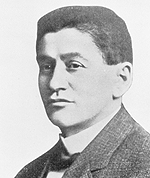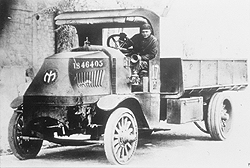The bulldog has come to symbolize Mack trucks, but it also embodies the characteristics of tenacity and ruggedness that drove the company’s founding brothers to create a durable legacy.
 | 
Mack Trucks Inc. |
 | John "Jack" Mack, the eldest of the brothers, is considered to be the founder of Mack Trucks. |
This year, Mack Trucks Inc. and fans of perhaps the most legendary name in the truck-making business are celebrating the company’s centennial anniversary. “From a small Brooklyn wagon shop, Mack has grown to become one of the world’s most famous brands,” said Michel Gigou, the current chief executive office of what is now an international firm.
What started out 100 years ago at the hands of John and Augustus Mack eventually involved five Mack brothers, all Pennsylvania descendants of team drivers who had crisscrossed Europe with wagons for generations. Transportation was in their blood.
The eldest son, John, who was called “Jack” and is often singled out as the company founder, left home at an early age to drive mule carts for the crews working on the Erie and Wyoming Valley Railroad in his home state.
 | 
Mack Trucks Inc. |
 | The AC model - nicknamed the "Bulldog Mack" by British troops - won the bulldog legend for Mack trucks on the battlefields during World War I. |
The second half of the 1800s saw the flowering of the Industrial Revolution in America. While carrying on the family tradition of hauling cargo, John Mack, still in his early 20s, also dabbled in his fascination with machinery. Following his railroad stint, he became the driver of a hoisting engine used to load coal onto barges in Scranton, Pa. Then he was put in charge of construction machinery used to improve the Croton Aqueduct, which brought water from the Catskill Mountains into New York City. Taking to sea, he was the second engineer on a ship that delivered supplies for building the Panama Canal, and that in turn led to a job as a dredge operator in the construction of the famed waterway. Before leaving Central America, he worked as a surveyor for another canal project in Nicaragua.
At age 25, Jack joined his brother, Augustus, at Fallesen and Berry, which built carriages and wagons at a factory in Brooklyn, N.Y. While his sibling worked in the office, Jack took a job as a steam engineer, but his interests soon expanded into all aspects of the plant’s production.
For the full story, see the Feb. 28 print edition of Transport Topics. Subscribe today.







